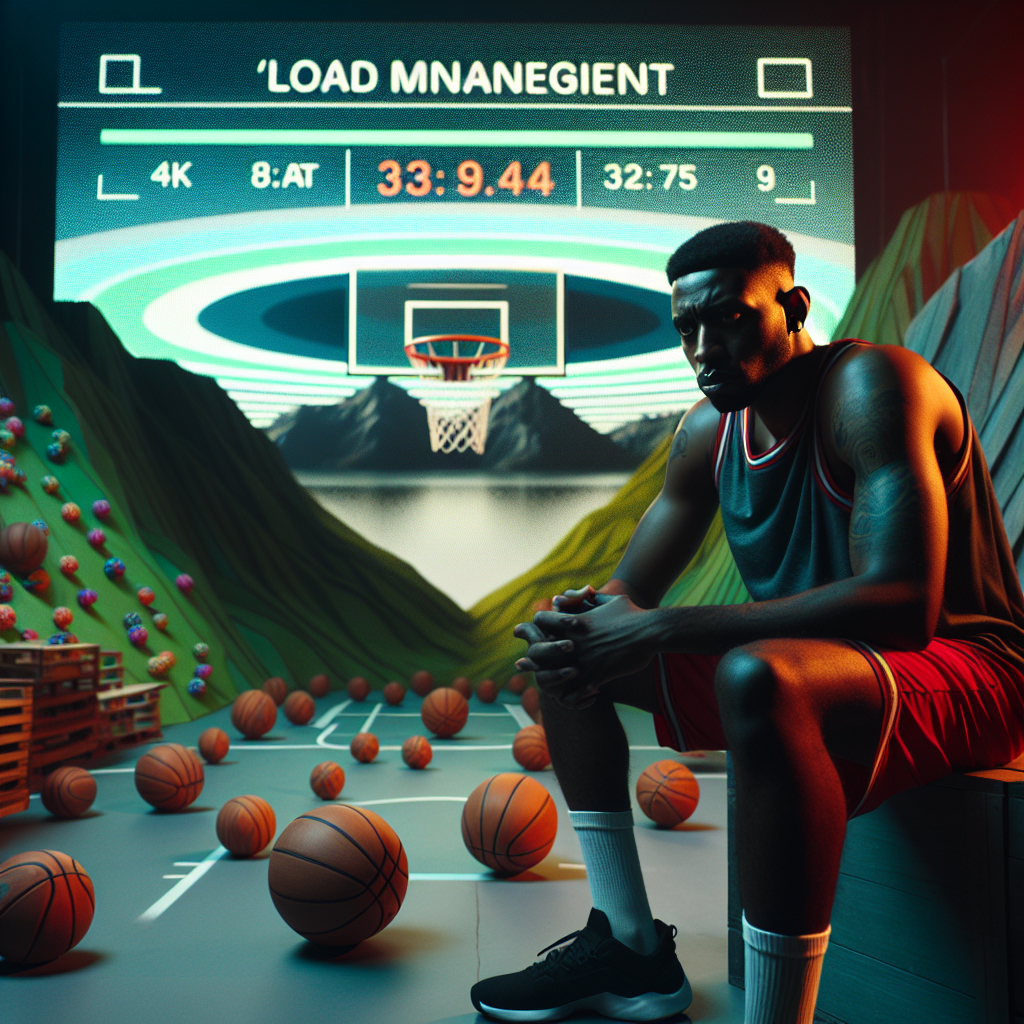Patrick Beverley takes issue with load management’s link to Clippers

Patrick Beverley’s Stance on Load Management in the NBA
Load management has become a hot topic in the NBA in recent years, with teams looking to preserve the health and longevity of their star players by strategically resting them during the regular season. While some see this as a necessary precaution to prevent injuries and ensure peak performance in the playoffs, others, like Los Angeles Clippers guard Patrick Beverley, have taken issue with the practice.
Beverley, known for his tenacious defense and relentless work ethic, has been vocal in his opposition to load management, particularly when it comes to his own team. In a recent interview, Beverley expressed his frustration with the perception that the Clippers rely heavily on load management to keep their players fresh.
“I don’t believe in load management,” Beverley said. “I think if you’re healthy, you should play. That’s just how I was raised. I want to be out there with my teammates every night, competing and giving it my all.”
Beverley’s stance on load management is rooted in his competitive nature and desire to be on the court as much as possible. He believes that sitting out games unnecessarily goes against the principles of hard work and dedication that he has always valued as a player.
While Beverley’s opinion on load management may be seen as old-fashioned by some, there is no denying the impact that it has had on the NBA in recent years. With teams increasingly prioritizing player health and longevity, load management has become a common practice for many organizations looking to protect their investments and maximize their chances of success in the postseason.
However, Beverley’s criticism of load management is not without merit. Some have argued that the practice can be detrimental to team chemistry and disrupt the rhythm of players who are used to playing regular minutes. Additionally, fans who pay top dollar to see their favorite players in action may feel shortchanged when stars are rested for seemingly minor reasons.
Despite these concerns, load management is likely here to stay in the NBA as teams continue to prioritize the long-term health and performance of their players. While Beverley may not agree with the practice, he understands that it is ultimately up to the coaching staff and front office to make decisions that they believe are in the best interest of the team.
As the NBA continues to evolve and adapt to the demands of a grueling 82-game season, the debate over load management is likely to persist. Players like Patrick Beverley, who value hard work and dedication above all else, will continue to push back against the trend, while others may see it as a necessary evil in the modern game.
In the end, the decision to implement load management ultimately comes down to a balance between player health and team success. While Beverley may not agree with the practice, he will continue to give his all on the court every night, regardless of whether his teammates are resting or not. And in a league where every game matters, that kind of dedication is something that should be celebrated, load management or not.
The Impact of Load Management on the Los Angeles Clippers

Load management has become a hot topic in the NBA in recent years, with teams looking for ways to keep their star players fresh and healthy throughout the grueling 82-game season. The Los Angeles Clippers are no exception, as they have implemented load management strategies for their players, including star point guard Patrick Beverley. However, Beverley has recently taken issue with the perception that load management is directly linked to the Clippers organization.
Load management is a strategy used by teams to reduce the number of minutes played by their key players in order to prevent injuries and fatigue. This practice has become increasingly common in the NBA, with teams like the Toronto Raptors and the Los Angeles Lakers employing it for their star players. The Clippers have also embraced load management, with players like Kawhi Leonard and Paul George sitting out games to rest and recover.
Patrick Beverley, known for his tenacious defense and fiery competitiveness, has been vocal about his opposition to load management. In a recent interview, Beverley expressed his frustration with the idea that load management is a reflection of the Clippers organization, stating that it is a personal decision made by individual players. Beverley emphasized that he takes pride in playing every game and giving his all on the court, regardless of the circumstances.
Beverley’s comments highlight the tension that can arise between players who prioritize playing time and those who prioritize rest and recovery. While load management can be beneficial in preventing injuries and prolonging a player’s career, it can also be seen as a sign of weakness or lack of commitment to the team. Beverley’s stance on load management reflects his competitive nature and his desire to be on the court as much as possible.
Despite Beverley’s objections, the Clippers have continued to implement load management strategies for their players. Head coach Tyronn Lue has emphasized the importance of balancing rest and playing time for his players, especially in a condensed season like the one the NBA is currently facing. Lue understands the need to prioritize the long-term health and well-being of his players, even if it means sitting them out for certain games.
The debate over load management is not unique to the Clippers, as it has sparked discussions across the league about the best ways to manage player workload. Some argue that load management is essential for preserving the health and longevity of players, while others believe that it undermines the competitive nature of the game. Ultimately, the decision to implement load management strategies lies with individual teams and players, who must weigh the benefits and drawbacks of such practices.
In the case of the Clippers, Patrick Beverley’s objections to load management highlight the complexities of balancing player health and competitiveness. While Beverley may prefer to play every game and give his all on the court, he must also consider the long-term implications of overexertion and fatigue. As the NBA continues to evolve and adapt to the demands of a grueling season, the debate over load management is likely to persist, with players like Beverley advocating for a more traditional approach to the game.
Analyzing the Debate Surrounding Load Management in Professional Basketball
Load management has become a hot topic in professional basketball in recent years, with players and teams implementing strategies to ensure the health and longevity of their athletes. However, not everyone is on board with this approach. Patrick Beverley, a guard for the Los Angeles Clippers, recently spoke out against load management, particularly as it relates to his team.
Beverley believes that load management is being unfairly linked to the Clippers, suggesting that the team is being singled out for criticism. He argues that load management is a league-wide issue and should not be solely attributed to one team. While Beverley acknowledges the importance of player health and wellness, he feels that the Clippers are being unfairly targeted in the debate surrounding load management.
The debate over load management in professional basketball is multifaceted, with arguments on both sides of the issue. Proponents of load management argue that it is a necessary strategy to prevent injuries and prolong players’ careers. They point to the grueling schedule of the NBA season, with back-to-back games and frequent travel, as reasons why load management is essential for player health.
On the other hand, critics of load management argue that it undermines the competitive nature of the sport and cheats fans out of seeing their favorite players in action. They believe that players should be able to tough it out and play through minor injuries, rather than sitting out games for rest. Critics also question the impact of load management on team chemistry and performance, suggesting that it disrupts the flow of the game and hinders a team’s ability to build momentum.
In the case of the Clippers, load management has been a point of contention throughout the season. The team has faced criticism for resting star players like Kawhi Leonard and Paul George in key matchups, leading to accusations of prioritizing individual health over team success. Beverley’s comments reflect the frustration felt by some players who are caught in the middle of this ongoing debate.
Despite the controversy surrounding load management, it is clear that player health and wellness are top priorities for teams in the NBA. With the physical demands of the sport and the long-term implications of injuries, it is understandable why teams would want to take a cautious approach to managing their players’ workload. However, finding the right balance between rest and competition remains a challenge for teams and players alike.
As the debate over load management continues to unfold, it is important for all stakeholders in professional basketball to consider the implications of their decisions. While player health should always be a top priority, teams must also be mindful of the impact that load management can have on the integrity of the game and the fan experience. Finding a middle ground that allows for player rest while maintaining competitive balance will be crucial in shaping the future of the sport.

